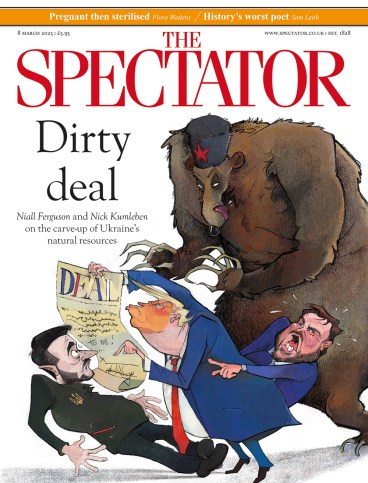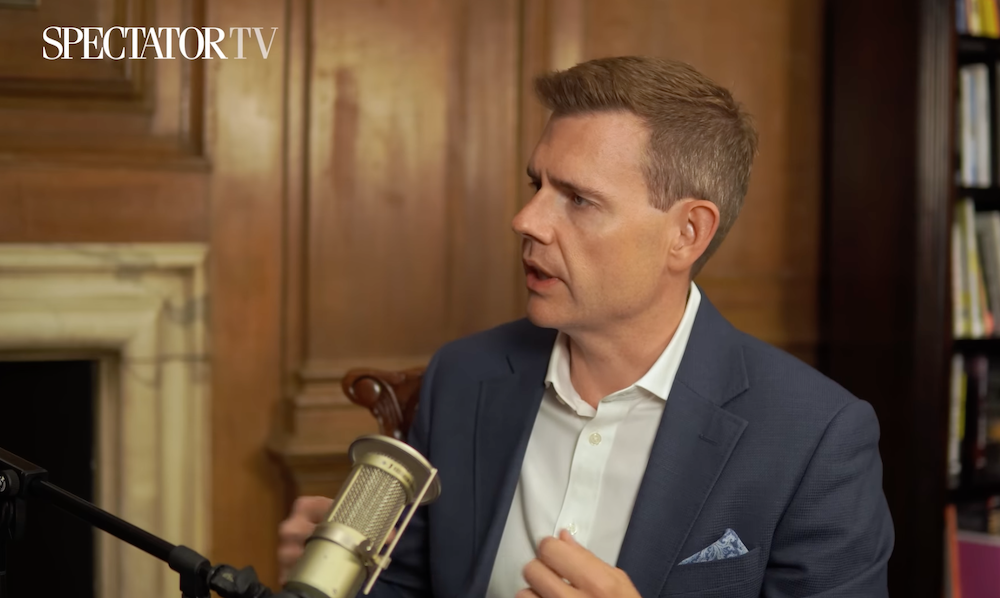
If James Bond, now in American hands, re-emerges refreshed as an agent of the CIA, then it will be a homecoming of sorts, given that his creator played a role in drawing up the blueprint for America’s first foreign intelligence service. In May 1941, Commander Ian Fleming sat down in Washington with Colonel William (‘Wild Bill’) Donovan to sketch out an agency modelled on British naval intelligence. Under Donovan’s stewardship, this became the Office of Strategic Services and, in 1947, the CIA.
The two men got on well and were not afraid to try things that had not been tried before. Fleming’s experience at the admiralty, notably in the propaganda section he started with Sefton Delmer, foreshadowed Donovan’s Office of Scientific Research and Development which went on to concoct exploding lumps of coal (‘Black Joe’) for the north African landings, and female sex hormones to be injected into Hitler’s vegetables to make his moustache moult and his voice turn soprano.
Fleming’s fingerprints are also all over the CIA’s postwar dirty tricks campaign against Fidel Castro under the direction of Allen Dulles, a diligent Bond fan. He oversaw unsuccessful plans not only to invade the Bay of Pigs but to assassinate the Cuban leader with, variously, a booby-trapped cigar, a poisoned aqualung and, most ludicrous, a detonating conch for Castro to pick up when snorkelling.
Another CIA director and admirer of Wild Bill, whom he had served under, was Bill Casey, a ‘freelance buccaneer’ whose untempered appetite for covert action as personified by Agent 007 led to the succession of catastrophic misadventures that I witnessed when growing up in Cambodia and then Latin America. These do not need recapitulating here. As with the Bay of Pigs fiasco, the ‘dirty tricks’ seemed more like the actions of a Bond villain than something Bond himself would do.
By the 1980s, the idea prevailed that the CIA did ‘awful things’ in the damning opinion of Helena Luczywo, the editor of Poland’s leading underground newspaper. Choosing to look the other way, Luczywo nonetheless accepted and relied on CIA money to produce Mazovia Weekly on three sheets of A4. For all their dicey provenance, another grateful recipient described these CIA funds, channelled through institutions such as the Ford Foundation, as ‘the basis of our existence’.
‘Once resistance meant taking up a gun. Now people instinctively took up typewriters’
Unsuspected and less well known is the remarkable success story Luczywo was part of – the ‘best kept secret’ of the Cold War, according to the CIA’s former chief historian Benjamin Fischer, the only person to have been granted access to the files. This covert CIA programme to undermine censorship in the Soviet bloc is the subject of Charlie English’s impressively detailed account. It is based on interviews with instrumental players, plus even a tour of the prison cell where Polish security services force-fed the young publisher Miroslaw Chojecki after arresting him for the 43rd time. Aptly among the CIA’s subversive weapons sent to arm Chojecki in his courageous culture war were videos of Bond films, especially ‘those that were most anti-Soviet’.
When the Soviet Union replaced Nazi Germany as the enemy, a close friend of Fleming, Frank Wisner, was appointed head of the CIA propaganda assets inventory to smuggle in truth rather than lies (or guns) behind the Iron Curtain. No country was more crucial than Poland, which received a third of the funds. English rightly singles out the courtly artist Josef Czapski, who had lectured on Proust to his fellow POWs in Russia and wrote an astounding memoir detailing the malignities of the Soviet system, Inhuman Land. It was Czapski and the formidable Paris-based editor Jerzy Giedroyc who travelled to the US in 1950 and persuaded the CIA to fund a programme to print and distribute newspapers and pamphlets, and truck uncensored books illicitly into Poland – as Chojecki put it, ‘to fill the silences and correct the falsifications’. It would later help enormously that President Carter’s security adviser Zbigniew Brzezinski and Richard Pipes in the State Department were both Poles.
Even though denied access to the CIA records, English does a first-rate job in piecing together this patchily known story in efficient, pacy prose. In a blatant early operation, codenamed Winds of Freedom, half a million hydrogen balloons were floated across the Czech border between 1951 and 1956, dropping 300 million leaflets, plus 260,000 copies of Animal Farm printed on lightweight paper.
Then, in 1956, a cosmopolitan Romanian raised in England, George Minden, was put in charge of the vastly more clandestine book programme. He named his discrete outfit the International Literary Centre (ILC). For the next 35 years, from his New York office on the 14th floor of 475 Park Avenue South, Minden distributed an annual budget of $2.7 million. This was small beer when set against the $700 million budget for, say, the CIA’s disastrous Operation Cyclone in Afghanistan. Yet in Tim Weiner’s judgment in Legacy of Ashes, the ILC was responsible for ‘the most important CIA operations of the Cold War’. Minden’s ‘Marshall Plan for the mind’, about which he never spoke, resulted in ten million items being shipped into eastern bloc countries, including cassettes, magazines, typewriters, and up to 70 printing presses annually – and in the final year 316,020 books, including titles by George Orwell, Czeslaw Milosz, Alexander Solzhenitsyn and Brzezinski.
For many of those crushed into the coarse grey hairshirt of communism, which demanded every typewriter be registered, Minden’s self-described ‘offensive of free, honest thinking’ was life-empowering, literally. The imprisoned writer Adam Michnik told English: ‘You could feel after reading a book that your spine would be straightening up. And you knew then that you can tell the state “No”.’ Poland’s most wanted man was Zbigniew Bujak. The youthful president of the Solidarity union’s Warsaw chapter remembered: ‘Once resistance had meant taking up a gun. Now, people instinctively took up typewriters.’
A farcical example of the Polish regime’s attempt to root out history and reliable information was the banning of a book about growing carrots ‘for implying that vegetables could sprout in individuals’ gardens, as well as in those run by collectives’. In its chauvinist blindness to individual freedom, the regime overlooked the fact that Poland’s main underground newspaper was edited by women. ‘They thought that Mazovia Weekly was being prepared by men all the time,’ said the woman who single-handedly brought out its most important edition, on 25 August 1988, following a spate of strikes that finally set the seal on General Jaruzelski’s dictatorship.
When Mazovia Weekly resprouted as Election Gazette, ‘eight pages of greying Polish paper’, it sold 450,000 copies during the semi-democratic election the following May, which resulted in Solidarity’s overwhelming victory and the first non-communist government in the Soviet bloc. One of English’s sources gives this salute to Minden’s ILC: ‘The publishing movement had played a huge role in developing and maintaining the Solidarity myth so that by 1989 we had an elite ready.’
In the finish, economic collapse is what did for communism as much as Orwell. In February 1988, the cost of food rose by half, electricity doubled, coal tripled. Aside from preparing an elite to govern, how much difference did those back-straightening gulps of freedom make? It’s hard to say, but Helena Luczywo recalled walking through an empty construction site in Warsaw where people were growing carrots in open land, and thinking: ‘What do they care about us or about Solidarity? They’re more interested in their little gardens.’
Now ‘disinformation threatens western liberal democracy as never before, while censorship and book bans are once again turning schools and libraries into ideological battlegrounds’. The Hillsborough County Public Schools district in Tampa, for example, will no longer allow students to read classics such as Hamlet and Romeo and Juliet in school, let alone Bond novels. English’s fine oral history of samizdat Poland in the 1980s provides a timely lesson for each and every one of us, whether we belong to the 6.6 per cent who currently live in a full democracy (according to a recent issue of the Economist) or not. Not least, it revitalises Andrei Sakharov’s warning: ‘Intellectual freedom is essential to human society’ and ‘the only guarantee against an infection of people by mass myths, which, in the hands of treacherous hypocrites and demagogues, can be transformed into bloody dictatorship’.








Comments